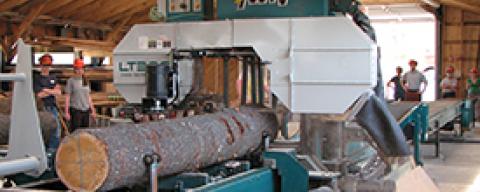Why A Written Contract Is Necessary
Selling timber is a complicated matter that involves knowing about markets, tree values, future tree potential, laws, safety, liability, ground conditions, and a host of environmental factors. It may be a “once in a lifetime” event with long term consequences for yourself and your land. (Note: for the purposes of this fact sheet, the term “timber sale” includes the sale of other products such as firewood and biomass chips).
A written contract is necessary for a timber sale so both buyer and seller have a clear understanding of the conditions under which the sale is made. The purpose of a written contract is to establish a “meeting of the minds”. It is a legally binding document protecting you and the buyer by listing the responsibilities of each. It should summarize any verbal agreements. It provides a road map for what you are trying to accomplish.
A written contract protects both the buyer and seller and allows each to see in writing what is expected of them. Since 2007, written contracts are required by law in New Hampshire.
You should know what you want from the transaction; understand the effect it will have on your land and your finances; and be knowledgeable about the terms of the contract. Buyer-prepared contracts may not protect your interests or rights as a landowner.
Well-written timber sale contracts clearly define conditions of the timber sale, the responsibilities for performance, and expenses. Any designation or condition in a timber sale agreement which doesn't express whose responsibility and at whose expense the burden lies can lead to unnecessary disputes. In other words, put in writing who is responsible for what and who pays for it!
What the law, RSA 227-J:15, says about timber sale contracts
A person is guilty of a misdemeanor if, in the course of buying or selling a forest product as defined in RSA 227-G:4, VII, he or she recklessly fails to provide a written contract to the owner, prior to the cutting from the owner’s property any forest products which are subject to a notice of intent to cut as defined in RSA 79:10. The contract shall be signed by both parties, specify the remuneration for the forest products to be cut, and the time in which remuneration shall be made.
What the law, per RSA 227-G:4, VII, says about buying forest products
“Buying a forest product” means exchanging money or services to purchase a forest product, or bartering for the exchange of a forest product.
The Role of Foresters in Timber Sales
You have many options how to go about selling your timber. One option is to hire a forester to act as your agent in the sale; another is to sell directly to a buyer, either an independent logger or a forester or some other representative of a mill. A forester who acts as your agent provides you with a work order or some other agreement specifying the type and cost of services to be performed. These foresters may be paid by the hour or as a percentage of the income from the sale. Foresters who buy standing timber aren’t acting as your agent. They work for and represent someone else. There isn't a work order specifying cost and types of service, though there should be a timber sale contract between you and whoever is purchasing the timber. State law, RSA 310-A:98-117, requires that all foresters offering services for compensation to private landowners be licensed.
Foresters prepare and monitor timber sales in a number of ways. The steps taken will depend on your management goals, the forest products harvested and their relative value. Landowners should expect a forester will, as a minimum, designate the harvest area, enter them into a legally binding contract with a buyer and provide some level of supervision of the harvest. More intensely prepared and supervised timber sales involve:
- pre-harvest marking, measurement and volume estimation of trees to be harvested
- preparation of harvest contracts including details of utilization specifications, down payments, performance bonds and payment schedules
- compliance and assistance with timber tax and other permitting requirements
- layout of skid trails, landing sites, wetland crossings and permitting
- showing and sealed bid procedures for awarding contracts
- a higher level of timber harvest supervision
- assistance with income tax reporting
How Timber is Sold
Each method of sale has different implications concerning landowner liability, worker’s compensation insurance, federal income taxes, and other considerations. It’s important to understand them before proceeding. The sample timber sale contract that follows is suited for the stumpage sale method.
Stumpage
Sale Most timber marketed in New Hampshire is sold by way of stumpage sales in which the value of the trees is given as they exist in the woods or “on the stump.” Stumpage value is the value associated with standing timber. Stumpage values offered for a specific timber sale at a given time depend upon market conditions, the total timber sale volume, the species and quality of the stumpage being sold, accessibility, and the seller’s knowledge. Payment for stumpage is usually made in one of two methods. Each has advantages and disadvantages.
The timber may be paid for by unit of volume (per thousand board feet, per cord or per ton) as it is removed and the scale (measurement of the product) delivered to the mill is accepted as the standard for payment. Records of delivery are kept on mill scale slips. Scale slips are the only concrete evidence of the actual volume of timber removed.
Timber may also be sold by what is referred to as a “lump sum” sale. Payment in this method is based on an agreed upon estimate of the total stumpage value. This timber sale method is best used when an accurate pre-harvest volume estimate is made. Lump sum payments may be made prior to the start of a harvest or by installment payments made at agreed upon intervals during the course of the harvest. Since the total amount of money is fixed in a lump sum sale, it’s important landowners know the value of their standing timber before entering into a lump sum sale agreement.
What the law, RSA 227-J:15, says about scale slips
The buyer must furnish the owner, upon written request, with all scale slips to verify the amount of the forest products removed from the owner's property.
A "scale slip'' means a written or printed form or combination of forms which provide an accurate, readily understandable record containing the species of wood product, board footage of each individual log when the standard unit of measurement is per thousand board feet, or tonnage or cordage when not sold per thousand board feet, gross scale, defect, net scale, date wood was measured, and the name of the party scaling the wood.
Roadside Sale
Roadside sale is a term used when a landowner either harvests the timber or contracts to have the logging done and sells the timber at a location accessible to a truck. Payment and measurement is most often made on the basis of mill scale though it can also be done where the timber is picked up. The sample timber sale contract that follows doesn’t cover all the aspects of this type of sale.
Delivered
Landowners are paid a delivered price when, at their expense, they are responsible for the harvesting and transportation to the mill. Mill scale is the basis for payment. This is commonly termed “contract logging”. If you are selling high value timber, this method of sale often yields more income. The sample timber sale contract that follows doesn’t cover all the aspects of this type of sale.
Overview of a well-written contract
A well-written timber sale contract should clearly:
- identify buyer and seller
- provide the location of the parcel being harvested
- specify the party responsible for designating property line locations
- specify price to be paid, basis of measurement, method and schedule of payment
- specify amount and type of performance bond or security deposit specify time limits for the timber sale including seasonal limitations if applicable
- provide for seller granting access to the tract of land for purposes of harvesting
- specify compliance with all federal, state and local regulations
- provide for protection of the residual stand with penalty provisions for unnecessary damage
- provide for restoration of skid trails, haul roads, driveways, and landings
- describe utilization expectations of all trees harvested
- include a disclaimer by the seller for any liability for accident or injury to the buyer, his/her employees or equipment
- require written proof of adequate worker's compensation and liability insurance
- provide for prohibiting assignment of harvesting rights to another without written consent of the landowner
- provide for resolution of disputes, perhaps a third party agreeable to buyer and seller
- assign liability for property damage (buildings, fences, walls, power lines, etc.)
- assign liability for damages and suppression expenses if a forest fire occurs as a result of the harvesting operation or because of carelessness of those involved in the harvesting
- provide for immediate termination of the sales agreement if any of the provisions of the agreement are not adhered to
- specify when the title for timber harvested transfers (usually when the wood is paid for rather than when it is cut)
Each timber sale is unique, so provisions of each contract may vary. Licensed foresters are experienced in writing sound timber sale contracts to meet specific client and property requirements. It may be advisable to obtain legal counsel when preparing a contract. Before proceeding with a timber sale, take time to become familiar with the process in order to make informed decisions. Seek the services of a qualified licensed forester to assist you.


